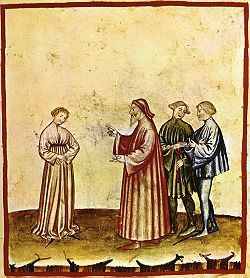
Discretion
Encyclopedia

Noun
In linguistics, a noun is a member of a large, open lexical category whose members can occur as the main word in the subject of a clause, the object of a verb, or the object of a preposition .Lexical categories are defined in terms of how their members combine with other kinds of...
in the English language
English language
English is a West Germanic language that arose in the Anglo-Saxon kingdoms of England and spread into what was to become south-east Scotland under the influence of the Anglian medieval kingdom of Northumbria...
with several meanings revolving around the judgment of the person exercising the characteristic.
Meanings
- "The Art of suiting action to particular circumstances" (Lord Scarman)
- 'the quality of being discreet' (Concise Oxford Dictionary)
Those in a position of power
Power (sociology)
Power is a measurement of an entity's ability to control its environment, including the behavior of other entities. The term authority is often used for power perceived as legitimate by the social structure. Power can be seen as evil or unjust, but the exercise of power is accepted as endemic to...
are most often able to exercise discretion as to how they will apply or exercise that power.
The ability to make decisions which represent a responsible choice and for which an understanding of what is lawful, right or wise may be presupposed. see Websters Third New International Dictionary (unabridged)
In the criminal justice system
In the criminal justiceCriminal justice
Criminal Justice is the system of practices and institutions of governments directed at upholding social control, deterring and mitigating crime, or sanctioning those who violate laws with criminal penalties and rehabilitation efforts...
system, police
Police
The police is a personification of the state designated to put in practice the enforced law, protect property and reduce civil disorder in civilian matters. Their powers include the legitimized use of force...
, prosecutor
Prosecutor
The prosecutor is the chief legal representative of the prosecution in countries with either the common law adversarial system, or the civil law inquisitorial system...
s, judge
Judge
A judge is a person who presides over court proceedings, either alone or as part of a panel of judges. The powers, functions, method of appointment, discipline, and training of judges vary widely across different jurisdictions. The judge is supposed to conduct the trial impartially and in an open...
s, and the jury
Jury
A jury is a sworn body of people convened to render an impartial verdict officially submitted to them by a court, or to set a penalty or judgment. Modern juries tend to be found in courts to ascertain the guilt, or lack thereof, in a crime. In Anglophone jurisdictions, the verdict may be guilty,...
are often able to exercise a degree of discretion in deciding who will be subject to criminal penalties
Sentence (law)
In law, a sentence forms the final explicit act of a judge-ruled process, and also the symbolic principal act connected to his function. The sentence can generally involve a decree of imprisonment, a fine and/or other punishments against a defendant convicted of a crime...
and how they will be punished. For example, the police officer may decide whom to formally arrest for an offense
Offense (law)
In law, an offence is a violation of the criminal law .In England and Wales, as well as in Hong Kong the term "offence" means the same thing as, and is interchangeable with, the term "crime"....
. For a traffic violation, a police officer may simply issue a warning
Warning (traffic stop)
When a traffic stop is made, a warning issued by the officer is a statement that the motorist has committed some offense, but is being spared the actual citation. Officers can use their own discretion whether to issue a citation or warning...
. A prosecutor may choose to pursue the same or different charges against the person a police officer has arrested. Discretion gives the prosecutor the power to dismiss a case against an arrestee based on factors such as the probability of conviction, the nature of the offense, the characteristics of the offender, and availability of adequate civil remedies. Plea bargain
Plea bargain
A plea bargain is an agreement in a criminal case whereby the prosecutor offers the defendant the opportunity to plead guilty, usually to a lesser charge or to the original criminal charge with a recommendation of a lighter than the maximum sentence.A plea bargain allows criminal defendants to...
ing also plays a major role in determining charges.
Abuse of discretion
The exercise of discretion by judgeJudge
A judge is a person who presides over court proceedings, either alone or as part of a panel of judges. The powers, functions, method of appointment, discipline, and training of judges vary widely across different jurisdictions. The judge is supposed to conduct the trial impartially and in an open...
s is an inherent aspect of judicial independence
Judicial independence
Judicial Independence is the idea that the judiciary needs to be kept away from the other branches of government...
under the doctrine of the separation of powers
Separation of powers
The separation of powers, often imprecisely used interchangeably with the trias politica principle, is a model for the governance of a state. The model was first developed in ancient Greece and came into widespread use by the Roman Republic as part of the unmodified Constitution of the Roman Republic...
. The standard of review
Standard of review
In LAW, the standard of review is the amount of deference given by one court in reviewing a decision of a lower court or tribunal. A low standard of review means that the decision under review will be varied or overturned if the reviewing court considers there is any error at all in the lower...
applied to appeal
Appeal
An appeal is a petition for review of a case that has been decided by a court of law. The petition is made to a higher court for the purpose of overturning the lower court's decision....
s from decisions involving the exercise of judicial discretion
Judicial discretion
Judicial discretion is the power of the judiciary to make some legal decisions according to their discretion. Under the doctrine of the separation of powers, the ability of judges to exercise discretion is an aspect of judicial independence...
is "abuse of discretion."
An abuse of discretion is a failure to take into proper consideration the facts and law relating to a particular matter; an arbitrary or unreasonable departure from precedent and settled judicial custom.

